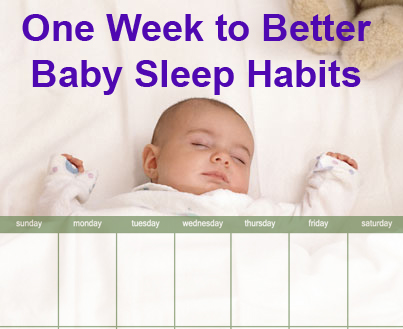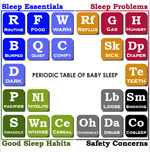 At eight months, one of my twins suddenly started waking up in the middle of the night. Normally, we’d let him cry it out, but we didn’t want him to wake his brother. Or the 2-year-old, for that matter. So we took to giving him a little bottle to settle him back down.
At eight months, one of my twins suddenly started waking up in the middle of the night. Normally, we’d let him cry it out, but we didn’t want him to wake his brother. Or the 2-year-old, for that matter. So we took to giving him a little bottle to settle him back down.
The trouble was, this conditioned his body to want that 3 a.m. bottle. It happened more and more. Finally, we figured out some of the contributing factors, and (with the help of our pediatrician) came up with a one week plan to get back on track. Here it is: seven days to healthy baby sleep habits.
Contents:
Baby Sleep Fundamentals
Day 1: Beginning Adjustments
Days 1-3: Weaning the Late-night Feeding
Days 4-6: Less Feeding, More Sleeping
Day 7: Sleeping Through the Night without Eating
Final Words: On Babies and Sleep
Baby Sleep Fundamentals
You’ll need to have some basic elements of baby sleep in place already to have a shot at this. Read these and think them over. Are you still taking all of the necessary steps to give your baby the best chance possible of sleeping through the night?
Sometimes it becomes easy to cut corners: to go without the swaddler because it’s laundry day and you’re out of blankets, or to skip the last bottle because you’re just too tired. Remember that healthy sleep habits will pay dividends, not just tomorrow, but every day after you get them established. Let’s cover the basics:
- Nighttime Feeding. Your baby needs a fully belly to fall asleep, and the right food to stay asleep. If your pediatrician has told you to start offering cereal, do it. If you’re on solid foods already, feed your baby a filling, nourishing meal at dinner time. Be aware that your baby will need more and more food as he grows. If you’re not surprised at how much he can pack away, you’re not offering enough. Right before bed, offer that last bottle of perfectly-warm milk or formula, to give him that warm and comfy feeling in his belly that puts even adults to sleep.
- Good burping. Especially with milk and formula, but even with solid foods, you have to get the gas out. This is especially true before bedtime, since digestive discomfort can wake your baby up at any time in the night. Burp early, and burp often.
- Clean, dry diaper. Right before bed, even if you just changed him 20 minutes ago and you’re sure that he’s still completely dry. Read more on why diapers are important for sleep.
- Soft, clean pajamas and a swaddler or sleep sack. Make your infant as comfortable as possible while ensuring that he won’t get chilly overnight. I prefer long-sleeve pajamas and a sleeveless fleece sleep sack, but find what seems to make your baby the most cozy. For help, see our guide on what a newborn should sleep in.
These may seem like small things individually, but together they’re the full package of what your baby needs before bedtime. Assuming we have these bases covered, let’s start on our one week to better baby sleep habits. We’re going to assume that your baby is at least 4 months old and still wakes up once (or twice) in the middle of the night to feed. Our goal: to have your baby sleep through most of the night, ten or twelve hours.
Day 1: Beginning Adjustments
The first day of our program, we will make two important changes. First, you will try an early bed time. You’re going to start the bedtime routine at the first signs of drowsiness in your infant, no more than an hour after dinner. I know that it seems counter-intuitive, but babies often sleep longer when put to bed early. Their natural bedtime is sooner than you expect.
At the first yawn or other sign of sleepiness, start the bedtime routine. Second, you’re going to change the way that you respond to your baby. Once he’s in bed, if he starts to fuss or cry, wait 15 minutes before going in. This is a hard, but necessary, part of your baby’s sleep training. It teaches him to soothe himself, and not expect mommy to rush in whenever he cries.
Days 1-3: Weaning the Late-night Feeding
If your baby wakes up in the middle of the night, you’re going to respond differently. First, as we’ve said, you’ll wait for 15 minutes before going in. This may mean that you need to sound-proof or put a fan in the rooms of your other children, so that the crying doesn’t wake them up. Second, when you do go in, first try reinserting the pacifier, tucking the blanket, and leaving.
For another 15 minutes. If he’s still crying, make a bottle that’s half of the usual amount you’d offer at night. In my case, it was cutting 4 ounces back to 2 ounces. Feed it to him, burp him, put him back down, and leave the room. If he cries, go in every 15 minutes to soothe as I said before. But that’s all the food you should offer until morning. With luck, he’ll go back to sleep right after the bottle.
Days 4-6: Less Feeding, more Sleeping
After three days, you’ll cut the bottle in half again (in my example, from 2 ounces to 1). Everything else is the same – 15 minutes before you go in, offering just the one bottle, etc. Now the late-night bottle is really just a soothing gesture. Essentially, you’re training your baby’s body not to need food to fall back asleep.
These days may be rough for you, but they’re the critical part of your 1-week program, because 25% of the expected bottle isn’t going to satisfy your baby if he’s truly hungry. You have to let him cry it out (in 15-minute segments) to get over the hump.
Day 7: Sleeping Through the Night without Eating
The final night may be the hardest, because the rule is: the baby does not eat in the middle of the night. We’re at the point where we are trying to break the conditioning once and for all. With luck, your baby, after having been weaned down over the past six days, will settle back down if he wakes up at all.
On this last night, if it’s usually mom who goes in to settle the baby, dad goes instead. This was an important change we made, because we figured that when mommy goes into the room in the middle of the night, the baby expects her to feed him. Dad is a new and unknown factor at this hour. It’s less hurtful and less surprising when doesn’t offer food.
If the baby won’t settle down, dad can offer him a bottle with a little bit of water (1-2 ounces at most). And then it’s pacifier (the best pacifier you can find), blanket, back to bed. No food until morning!
Final Words: On Babies and Sleep
 All babies are different; heck, even our twins were different. After 4-6 months by the baby sleep charts most babies are capable of sleeping through the night. By “capable” I mean that their bodies can physically go that long without food.
All babies are different; heck, even our twins were different. After 4-6 months by the baby sleep charts most babies are capable of sleeping through the night. By “capable” I mean that their bodies can physically go that long without food.
For some this talent comes easily, but most of us have to work at it. It’s worth a week of dedicated effort, by both parents, to improve your baby’s nighttime sleep habits. Please, give it a try, come back, and leave us a comment with how it went!
You might not succeed completely on the first try. But you’ll learn things about your baby’s natural sleeping patterns, and what he or she is truly capable of. Keep at it!
If you liked this article, you might want to subscribe (free) to get updates by e-mail or RSS.
What To Read Next
If you like this article, you might want to subscribe by e-mail or RSS so that you’re notified when new content is posted.
 |
 |
 |
 |
| Baby sleep problems takes you through the most common sleep issues and how to address them. | The periodic table of baby sleep has all the essential elements for healthy baby sleep habits. | Visit our sleep training section for strategies and tips for teaching your baby to sleep through the night. | Check out our reviews of Essential baby gear for helping babies sleep at night. |